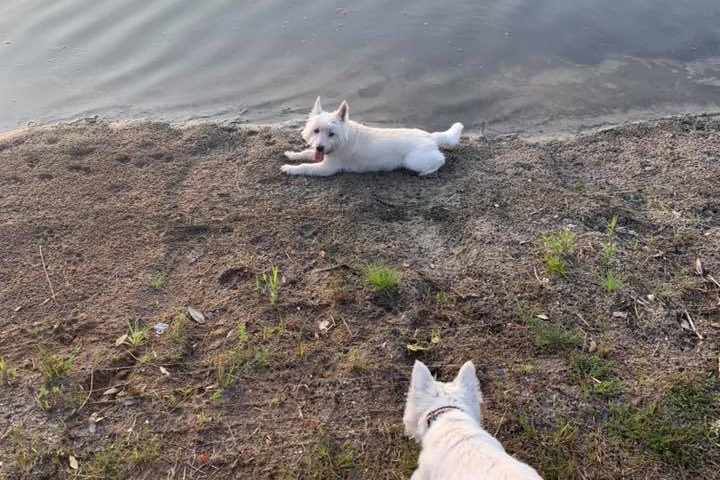Two North Carolina women hope to spare other dog-lovers from the heartbreak they endured, after a visit to the pond ended with their three pups dying of toxic algae poisoning a few hours later.

Melissa Martin and Denise Mintz brought their dogs Abby, Izzy and Harpo to the pond to cool off after a hot day in Wilmington, N.C., last Thursday. The dogs played in the mud, swam in the water and chased each other around, relishing every moment.
Unbeknownst to both dog and owner, they were also being exposed to blue-green algae, a toxic bacteria that can cause extreme reactions in humans and animals, including liver failure and death.
The dogs collapsed into a series of seizures later that evening, and a trip to the vet couldn’t help them. All three dogs died of liver failure shortly after midnight.
“I wish I could do today over,” Martin wrote in an emotional Facebook post on Friday morning, less than an hour after the dogs died.

Get daily National news
“What started out as a fun night for them has ended in the biggest loss of our lives.”
Martin and Mintz are now planning to visit every affected body of water in their area so they can post signs warning of toxic algae.
“We are now on a mission,” Martin said.
Blue-green algae, also known as cyanobacteria, can produce one of the most powerful poisons found in nature, according to the U.S. Centers for Disease Control and Prevention (CDC). It can grow in lakes, rivers and ponds through most of the United States and Canada, and often grows due to fertilizer runoff from farmers’ fields.
Blue-green algae is not always visible, but it usually smells like freshly-cut grass or rotting garbage, according to information on the Ontario government’s website. Only some species of the algae produce deadly toxins, but it’s impossible to tell just from looking at it.
The CDC says toxic algae is a threat to both humans and animals, although dogs are particularly vulnerable because of their love of swimming.
“Dogs will get in a body of water even if it looks or smells bad, including when it contains cyanobacteria,” the CDC says. “Dogs are also more likely to drink the contaminated water.”
RELATED VIDEO: String of dogs died from toxic algae in Fredericton in 2018
The CDC recommends rinsing off dogs immediately and preventing them from licking their fur after suspected exposure to blue-green algae.
Martin and Mintz hope to spread the word about blue-green algae so no one else has to go through what they did with their pets.
“We are gutted,” Martin wrote on Facebook. “We will make sure every standing body of water has a warning sign.”

_848x480_1573701187736.jpg?w=1040&quality=70&strip=all)






Comments
Want to discuss? Please read our Commenting Policy first.